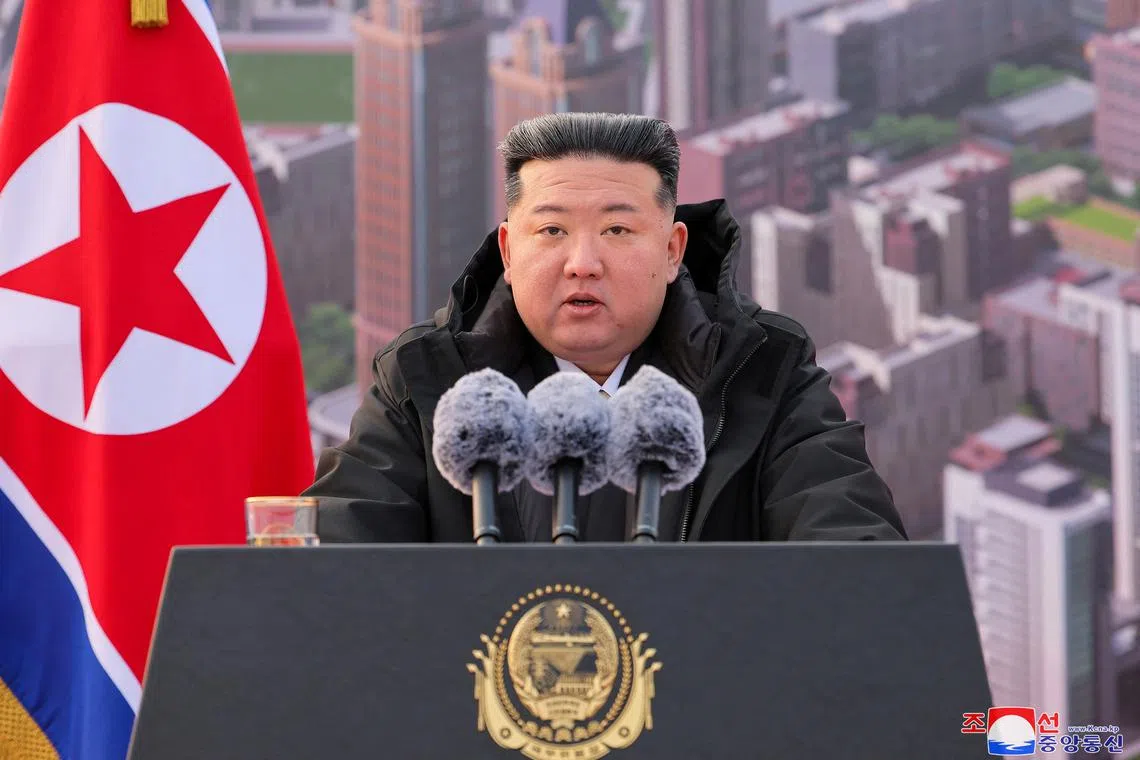North Korea test-fires new weapons ahead of Russian security chief visit
Sign up now: Get insights on Asia's fast-moving developments

North Korean leader Kim Jong Un oversaw the test-firing of the country’s latest anti-aircraft missile system on March 20.
PHOTO: REUTERS
Follow topic:
SEOUL - North Korea said on March 21 it had test-fired a new weapons system that would boost its combat readiness, as Russia’s security chief arrived in Pyongyang for talks with leader Kim Jong Un.
Traditional allies Russia and North Korea have drawn closer since Moscow’s 2022 invasion of Ukraine, with Seoul accusing Mr Kim of sending thousands of troops
Neither Moscow nor Pyongyang has officially confirmed the troop deployment, but the two countries in 2024 signed a sweeping military deal, including a mutual defence clause, when Russian President Vladimir Putin made a rare visit
Moscow’s top security official Sergei Shoigu has arrived in North Korea for a visit, Russian news agency Tass reported on March 21, the latest in a recent series of high-level exchanges between North Korea and Russia.
Mr Shoigu is scheduled to meet Mr Kim and other North Korean officials, both Tass and RIA Novosti reported.
Mr Kim oversaw the test-fire of the country’s latest anti-aircraft missile system, the Korean Central News Agency (KCNA) said on March 21, without specifying when the test happened.
Mr Kim said it showed North Korea’s army would be “equipped with another major defence weapon system with laudable combat performance”, KCNA said.
The announcement came a day after South Korea wrapped up a major annual joint military exercise with the US, known as Freedom Shield, which Pyongyang separately denounced on March 21 as “a rehearsal of war of aggression”.
The North – which attacked its neighbour in 1950, triggering the Korean War – has long been infuriated by any military exercises between the US and the South.
Seoul said last week the North had fired “multiple unidentified ballistic missiles” after it began the joint drills, which involve US soldiers stationed in South Korea.
Pyongyang also carried out a test-launch of strategic cruise missiles in the Yellow Sea in late February, which it said showed off “counter-attack capabilities”.
The most recent Freedom Shield exercise featured a collaborative drill focused on countering weapons of mass destruction, specifically targeting nuclear, chemical, biological and radioactive threats.
Relations between Pyongyang and Seoul have been at one of their lowest points in years, with the North launching a flurry of ballistic missiles in 2024 in violation of UN sanctions.
Tests for Russia?
Dr Ahn Chan-il, a defector-turned-researcher who runs the World Institute for North Korea Studies, told AFP that the latest launch appears to be “the testing of weapons for export to Russia to be used in Ukraine”.
Pyongyang is using the US-South Korea joint exercises as an excuse to develop and export such weapons to Moscow, he added.
South Korean and Western intelligence agencies have said that more than 10,000 soldiers from the reclusive North were sent to Russia in 2024 to help it fight a shock Ukrainian offensive into the Kursk
Seoul’s spy agency said in February that the North has sent more soldiers and re-deployed several to the front line in Kursk.
Seoul has also accused the North of sending container loads of weapons to Russia, and a recent report by Seoul’s Defence Ministry said the North was “continuing to provide weapons, ammunition and other military support to Russia following its troop deployment in the Ukraine war”.
North Korea’s repeated weapons tests are aimed as “showcasing the development of strategically valuable weapons”, Mr Hong Min, a senior analyst at the Korea Institute for National Unification, told AFP.
“If North Korea improves its missile interception and air defence capabilities through technological cooperation with Russia... it could significantly affect South Korea’s ‘kill chain’” defence plan, he said.
“In particular, North Korea may receive assistance for its vulnerable radar systems and field command vehicles from Russia,” he added. AFP

